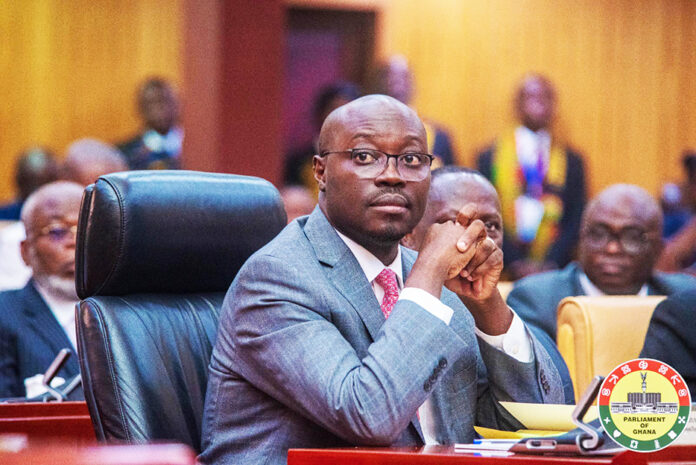The minority leader, Dr Cassiel Ato Forson, says government’s desperation to introduce a Legislative Instrument, Regulations 2023, that would impose Restrictions on Imposition of Selected Strategic Products would likely be a fertile ground for breeding corruption and cronyism.
The minority, he said would, therefore, resist any attempt by the government that would give the Minister of Trade and Industry the sole prerogative and unfettered power to grant licenses to any person desirous of importing into the country some essential items.
Addressing the NDC’s Moment of Truth press engagement, at the party’s headquarters, Dr Forson explained that the intended exclusivity for the Minister for Trade and Industry would have a far-reaching consequence on all Ghanaians.
Following the foreseeable ramifications the intended legislative would likely have on ordinary Ghanaians, many direct and indirect businesses that would likely face the full brunt if the LI have all intensely opposed to it.
The Joint Business Consultative Forum, comprising reputable associations such as the Ghana Union of Traders’ Associations (GUTA), Food and Beverages Association of Ghana (FABAG), Importers and Exporters Association of Ghana have supported the minority’s position on the matter.
Other reputable institutions, which have kicked against the government’s move include; the Ghana Institute of Freight Forwarders (GIFF), Chamber of Automobile Dealership Ghana (CADEG) and Ghana National Chamber of Commerce and Industry (GNCCI).
If the proposed LI becomes operational, the Minister of Trade and Industry would automatically have an unchecked discretionary power to issue import licenses and to restrict the quantity of certain imports into the country, without any checks and balances.
The Import Restrictions Regulations would affect goods such as Rice, Guts, Bladders, Stomach and intestines of animals, Poultry, frozen cuts and offal of fowl, vegetable, coconut and palm oil, canned tomatoes, aluminium products, margarine and fruit juices.
Others are soft drinks, mineral water, Ceramic tiles, Corrugated paper and paper board, Mosquito coil and insecticides, Soaps and detergents, Motor cars, Iron and steel, Diapers, Polymers (plastic and plastic products) Fish, Sugar, Clothing and apparel, Biscuits.
Addressing the press, Dr Ato Forson stated that in principle the “NDC is not against any legal regime or policy that seeks to protect indigenous businesses by regulating imports.
“What we are vehemently against is a law that confers unfettered discretionary power on a single individual, in this case a Minister of Trade, to issue import licenses and to restrict the quantity of certain imports into the country, without any checks and balances”.
Dr Forson explained further that the proposed Import Restrictions Regulations laws often bred corruption and cronyism and could easily be abused to create a monopoly for some few individuals.
Another ground on which the minority is opposed to the LI is that the regulatory framework proposed by the LI was not only opaque but could lend itself to arbitrariness and abuse.
Under the proposed regulations, the Minister of Trade and Industry would constitute himself into a judge in his own court, in the sense that the same Minister, seized with the power to grant, renew or cancel an import license, would equally be clothed with the power to unilaterally determine a review application against his own decisions.
“It is instructive to note that currently, Ghana does not have any significant local capacity to produce some of the “strategic products” listed under the First Schedule of the proposed LI, such as sugar, among others.
“Nevertheless, the government has not outlined any specific interventions or incentives to promote the local production of such products to support the government’s claim that the proposed regulations would promote local production of the affected products and conserve foreign exchange”, he said.
According to the NDC, the proposed regulations would gravely offend some international trade treaties and protocols that Ghana is a party to, as it would contravene the World Trade Organisation (WTO) trade facilitation agreement, particularly on quantitative restrictions.
This, the minority leader feared, could lead to serious retaliatory action by Ghana’s trade partners and eventually, affect exports from Ghana.
“It should be obvious to any discerning mind, that the excessive discretionary powers that the law grants a Minister for Trade, will afford him the opportunity to subject the issuance and renewal of import permits to crony or state capture,” he said.
If this law is allowed to pass, a Minister of Trade will be handed a blank cheque to deny those who are not in his good books, licenses and create powerful trade cartels who would monopolise the importation of these essential commodities.
This has the potential to create supply disruptions and shortages of certain goods in the economy, with its concomitant effects on inflation.
This, the minority indicated, was clearly going to be an avenue for extortion and corruption as it would give exclusive power and authority to the minister of Trade and Industry if allowed to stand.
Surprisingly, stakeholders such as the importers and the business community have amply demonstrated that these regulations in the current state, lacked broad consultation and consensus.
The NDC, therefore, called on the government to withdraw the regulations immediately and broaden its engagement with all key stakeholders so as to address the legitimate concerns raised by the stakeholders.
In the considered view of the NDC, the proposed import restriction regulations are regressive, counter-productive and have the potential to breed corruption just like the days of “essential commodities” and “price control”.
The minority called on the Trades Union Congress (TUC), Civil Society Organisations (CSOs), traditional authorities, the clergy and all progressive forces to speak up and join them to reject the obnoxious import restriction regulations in the supreme interest of Ghana.










